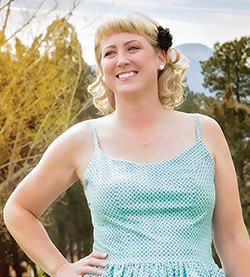Lung Cancer Survivor
Nobody Deserves Cancer
 Exercise enthusiast Lisa Moran chooses not to let a Stage IV lung cancer diagnosis at age 44 get in the way of living life. Today, she is a lung cancer advocate and encourages others to speak with their doctors about molecular testing.
Exercise enthusiast Lisa Moran chooses not to let a Stage IV lung cancer diagnosis at age 44 get in the way of living life. Today, she is a lung cancer advocate and encourages others to speak with their doctors about molecular testing.
When I hiked up the Manitou Incline on Pikes Peak, I felt physically at my best, but my breathing was labored. Friends and family suggested it was the change in altitude. My breathing problems progressed to a persistent cough and heaviness in my chest, but more than one doctor said my lungs sounded clear. When a friend asked if I would climb the incline with her, I agreed but felt it would be safer for both of us if I had my breathing problems checked before making the trek again.
Results from an X-ray and CT scan confirmed a mass in my lung. I had a bronchoscopy to take a tumor sample, and I was diagnosed with Stage IV non-small cell adenocarcinoma of the lung. I was told it was inoperable and incurable.
I had a large tumor in one lung with tiny star-like nodules throughout both lungs and a tumor on my spine. How do you have a tumor on your spine and not know it?
My tumor tested positive for the epidermal growth factor receptor (EGFR) mutation. I began targeted therapy and radiation therapy to shrink the large lung tumor, and I had a one-time stereotactic radiosurgery to shrink the tumor on my spine. I was considered no evidence of disease (NED) for several months.
Fatigue from the radiation therapy forced me to cut my work days short, but I worked my way back up to full days. Working and staying physically active helped.
My first targeted therapy drug gave me painful rashes on my body and extreme skin, muscle, bone and joint pain. I researched and learned my side effects were more severe than expected. I told my oncologist, but I felt my concerns were dismissed. I saw a new oncologist who recommended switching to a similar targeted therapy drug. I was nervous because the previous medication had helped me achieve NED. He said, “Lisa, it’s like switching from Coke to Pepsi.” His words were comforting, so I switched. I still have skin irritation and dry skin, so I use a thick moisturizer daily.
Cutting back on activities is emotionally difficult. I eased into running again. I’m not as fast as I was. Sometimes I compare myself to my pre-cancer self, which is a bad habit. I joined online support groups and find them extremely helpful.
I am an advocate for much needed and underfunded lung cancer research and gene testing of tumors. I try to raise awareness and end the smoking stigma that surrounds lung cancer. The first question often asked after someone hears about a lung cancer diagnosis is “Do you smoke?” I smoked off and on as a teenager and in my 20s. I quit 14 years before I was diagnosed. It’s possible that smoking didn’t cause my lung cancer, but it’s difficult to escape the stigma.
It doesn’t matter whether you smoked — nobody deserves cancer.


